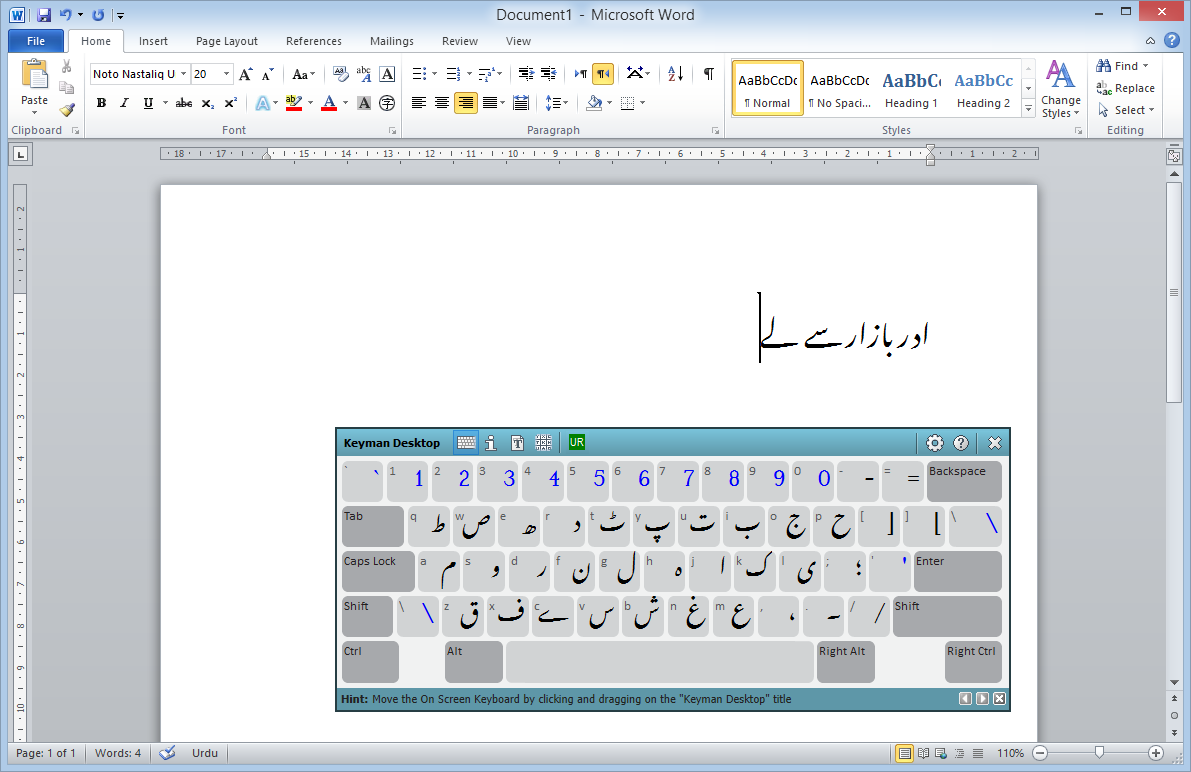The best website for free high-quality This Montain Urdu For Microsoft Word fonts, with 26 free This Montain Urdu For Microsoft Word fonts for immediate download, and 53 professional This Montain Urdu For Microsoft Word fonts for the best price on the Web. Download, view, test-drive, bookmark free fonts. Features more than 13,500 free fonts. Urdu pont-101 urdu phount-101 urdu fnt-102 urdu doted fnt-103 urdu phont.
Recommended Fonts | Keyboard Layouts | Mac vs. PC vs. Linux Rendering Issues | CreditsRecommended Fonts
The SALRC recommends the following fonts for Urdu language pedagogy and Internet applications:
Note: Baluchi, Brahui, Kashmiri, Lahnda, Panjabi Shahmukhi make use of additional letters not found in Urdu script; fonts that support these languages have been specifically noted below in the 'Download/Install' column.
[Click on font names or samples for specific information and text samples for each font.]
[ A - G ]| [ H - Q ]| [ R - Z ]

Nafees Naskh (Nafees Naskh.ttf)
Free download from the Center for Research in Urdu Language Processing (CRULP).
Note: Also supports Panjabi Shahmukhi.
Nafees Nastaleeq (Nafees Nastaleeq.ttf)
Free Fonts To Download
Free download from the Center for Research in Urdu Language Processing (CRULP).
Nafees Pakistani Naskh (Nafees_Pakistani_Naskh.ttf)
Free download from the Center for Research in Urdu Language Processing (CRULP).
Note: Also supports Balochi, Pashto, Punjabi Shahmukhi, and Sindhi.
Nafees Web Naskh (NafeesWeb.ttf)
Free download from the Center for Research in Urdu Language Processing (CRULP).
Tahoma (tahoma.ttf and tahomabd.ttf)
Commercial font supplied with Microsoft Windows 2000 and XP.
Note: Also supports Balochi, Brahui, Kashmiri, Lahnda, Panjabi Shahmukhi, Pashto, and Sindhi.
Free Download Urdu Fonts For Mac Free
Input Schemes and Keyboard Layouts
Download Free Fonts For Pc
For typing in Urdu on Windows platforms, the SALRC recommends the following options:
- Windows XP/Vista Keyboard Layout: Microsoft Windows XP includes keyboard layouts for typing with Urdu Unicode fonts through the installation of its optional multilingual support. Follow the instructions about 'Enabling South Asian Language Support' and 'Activating Keyboard Layouts' on the 'How to Install Fonts and Layouts' page (in the left navigation bar). The keyboard may be viewed with the On-screen Keyboard Viewer (Start > Program Files > Utilities > Accessibility > On Screen Keyboard). As the default Urdu keyboard is not phonetic, many users may prefer to install a phonetic one (see below).
- The Center for Research in Urdu Language Processing provides a Urdu Phonetic Keyboard for Windows . This keyboard is phonetic and like the InPage keyboard. Follow the instructions above about how to enable South Asian language support before installing this keyboard.
- OpenOffice.org: A free, open-source office suite project that is Unicode-savvy, OpenType enabled, and able to run on Linux/Sparc, Mac OS X (with X11), and all modern Windows platforms, including Windows 95.
Rendering issues: Mac vs. PC
The fonts recommended on this page have been tested for functionality on PCs running Windows XP. They are unsuitable for use with Macintosh computers, because they make use of OpenType technology, developed jointly by Microsoft and Adobe, for displaying vowel signs (matras) and ligatures appropriately. While OS X also recognizes OpenType layout tables, it uses a different rendering engine (ATSUI), and these fonts are written for Microsoft's engine (called Uniscribe).
Perso-Arabic scripts are supported from OS X (10.3.x), with the optional installation of additional language support. Using the Mac's own Arabic Unicode fonts, the user will be able to view Urdu-encoded websites using Safari and to produce Unicode-compliant documents using TextEdit. However, support is limited to applications like TextEdit and Safari. Kamal Abdali's Urdu on the Mac webpage provides instructions on how to enable Urdu and also provides a phonetic keyboard.
These fonts will probably work on most Linux systems, either now or in the future.
Additional Resources and Credits
The content and design of this page rely largely on Alan Wood's Unicode Fonts and WAZU JAPAN's Urdu Unicode Fonts; these sites are excellent and up-to-date resources to find fonts, text editors, browsers, and other Unicode resources. The statistics and other font details appearing on this page have been reproduced with their permission. Visit Penn State's Urdu Computing Informationpages for additional Unicode support. Further discussion of Urdu language processing issues may be found at the CRULP or within the lively and knowledgable Urdu on-line community of weblogs, forums, and email lists; e.g., UrduWiki, Urdu Planet, Urdu Blogs. Sean Pue (Columbia University) and Manan Ahmed (University of Chicago) have provided invaluable assistance and guidance in the creation of this page.

Comments are closed.